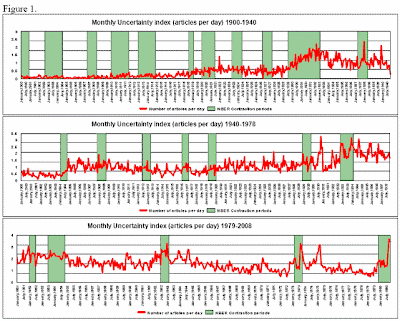Peak Uncertainty Theory and the Alexopoulos-Cohen postulation

The abstract on Vox reads:
This column claims that uncertainty shocks affect on economic activity with remarkable swiftness, strength, and durability. Capturing expectations of average citizens in Main Street through the use of keywords in main newspapers, it indicates a modest decline of uncertainty since October 2008, suggesting that the worst may be behind us.
Yeah everything will be peachy because the sub-editors have grown tired of using the same terms over and over again. All this from checking 4 key words in some newspapers. Sounds dubious.
What we are talking about perhaps is peak uncertainty. The authors suggest this may have already happened. Are we at the middle of the recessionary tunnel when we can see the light of growth and improving conditions at the end, or is that at the extreme end of the tunnel and nowhere near the middle? Will we not know we are out of the tunnel until we are actually out of it? I think it was evident there was an economic plateau happening in 2007 and early 2008 with an expected unwinding occuring because of the unsustainability of the asset prices backing the credit market and the limits of lending capability. These were problems built on structural issues, so to suggest we have passed a peak at this point is brave. They say:
Our statistical results suggest that uncertainty shocks act on economic activity with remarkable swiftness (the shock has an almost immediate negative impact on growth and productivity), strength (they explain over 25% of the variance of output and productivity within two years), and durability (the effects linger for a number of quarters). Moreover, the current uncertainty shock - that effectively dates from the Bear Stearns bailout - is the largest of the twentieth century, greater even than that associated with the October 1929 stock market crash.
The correlation between the uncertainty articles per day and periods of contraction is interesting more than compelling:

the pattern displayed by our uncertainty index for the current crisis resembles more the sharp, short-lived ups and downs of the 1970s and early 2000s than it does the long drawn out rise and sluggish fall of the Depression years. This would seem to suggest that the current crisis, despite its gravity, does not mark the end of the world as we know it. Second, in keeping with the old adage that it is often darkest just before the dawn, the numbers in Table 1 indicate that the light of a new day may just be visible on the horizon. Our uncertainty index, in this case based on data from six major US newspapers, shows a sharp run-up in uncertainty through October 2008 and a modest decline since. Two months do not make a trend but the drop is definitely encouraging. Although the negative economic consequences of the severe shock are likely to dog the economy for some time, we would guess that the worst is, indeed, behind us. Or, to employ Bloom’s horror film metaphor, the credit crisis has us (with good reason) perched on the edge of our seats, white-knuckled and wide-eyed. But, it is well to remember that the heroine while a little worse for wear, usually lives to welcome the dawn of a new day.
I disagree. America is up shit creek. The adjustments they have to make will be painful. Their analysis borders on the delusional.
As for Peak Uncertainty Theory - it's getting to the point where the consensus is: we just don't know.













1 Comments:
BENDY-BANANA IS BETTER THAN BANANA-RAMA!
Post a Comment
<< Home